(Updated at 4:45 p.m.) Local elected officials, including Rep. Gerry Connolly, gathered in Lorton on Wednesday to celebrate the introduction of 42 new electric buses to the division’s fleet.
These buses, which were funded by a $16.5 million federal grant announced in January, join the 18 electric buses already in operation. Although the division currently operates over 1,600 diesel buses, county officials emphasized that these new electric buses mark the start of a larger transition.
“I know that this downpayment is the beginning of something much larger, and that’s going to take many years for us to complete,” School Board Chair Karl Frisch told the crowd of attendees at Lorton Station Elementary School on Wednesday.
“But I’m confident with our continued activism by our students, their parents, our Moms Clean Air Force and our school board colleagues and our friends at the state and federal level that we can get there because we absolutely have to,” he continued.
FCPS has pledged to provide entirely carbon-neutral student transportation by 2035. So far, the division has reduced 38% of its greenhouse gas emissions from 2008, according to the 2022 FCPS Greenhouse Gas Inventory Report.
In January 2021, the division received its first electric school bus as part of a Dominion Energy-led initiative aiming to replace all diesel school buses in Virginia by 2030. However, the Virginia House of Delegates rejected the expansion of this program, opting instead to create a grant fund.
In March, VDOT announced it had allocated $11.3 million in federal funding to assist the statewide construction of electric vehicle charging stations.
FCPS received eight electric buses from Dominion in 2021 and secured a state grant for 10 additional buses through a settlement with Volkswagen, which had been sued for emissions test cheating in 2016.
The new federal grant funds come from the Bipartisan Infrastructure Law, signed by President Joe Biden in 2021. The grant, administered through the EPA’s Clean School Bus Program, allocates $5 billion to the Clean School Bus program which is dedicated to replacing existing school buses with zero-emission and low-emission models.
“Every day throughout the United States we’re transporting 10s of millions of students on buses, and many of those buses are anything but clean,” Connolly said during the event.
“Here in Fairfax we’ve got 1,600 school buses, and today’s a great down payment toward a movement for replacing every one of them and making sure our kids are safe and in a healthy environment but also in a vehicle that is not contributing to the environmental problem,” he added.
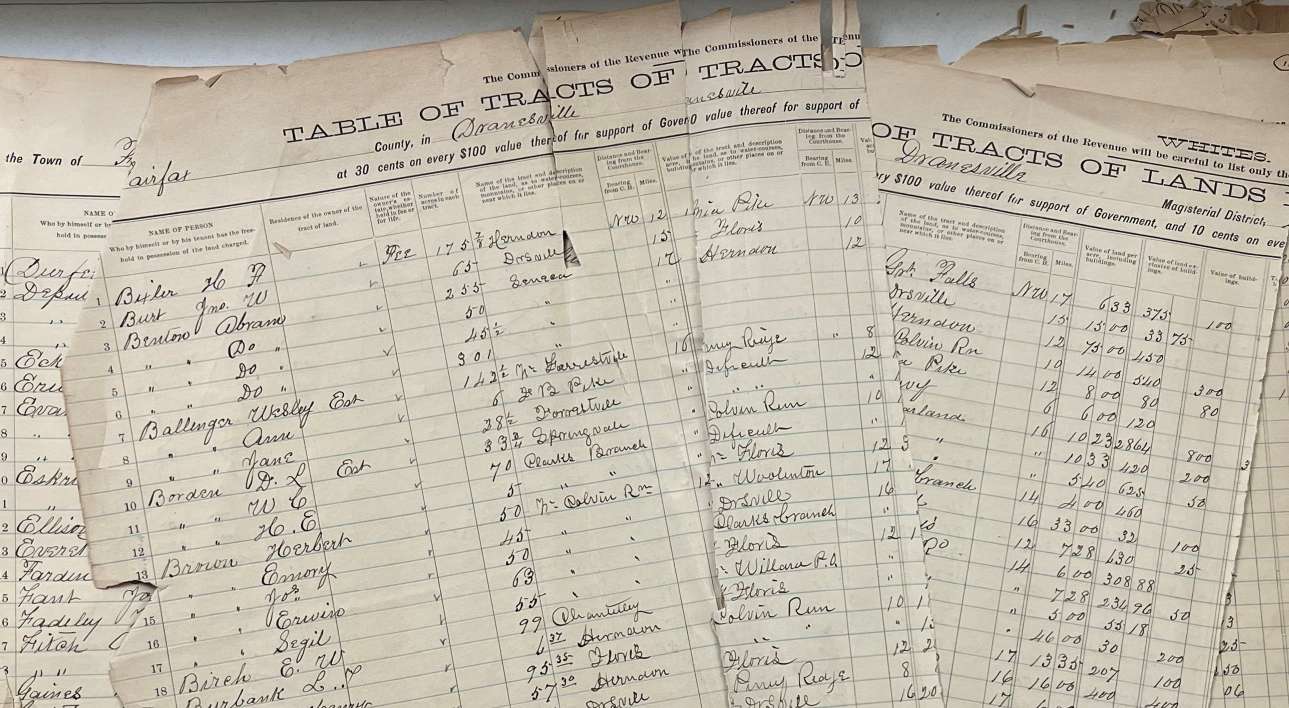
(Updated at noon) Fairfax County landowners interested in comparing their current tax assessment with what they might’ve been charged at the tail end of the 19th century will soon be able to find that information online.
Local land tax books from 1891 and 1896 are among the records that the Fairfax County Circuit Court Clerk’s Office plans to preserve and digitize after receiving a nearly $21,270 state grant.
Announced by the Library of Virginia last Thursday (Feb. 29), the award will also be used to preserve marriage license books from 1867-1895 and 1896-1928, an 1880 Federal Census Book, and “Deed Book Liber O-6 1904,” according to the clerk’s office.
“We’re very excited to receive this grant from the Library of Virginia,” Fairfax County Circuit Court Clerk Chris Falcon said. “I am thankful we have such a great collection of records and want to make sure they are properly maintained. It is our collective responsibility to preserve this invaluable resource for future generations.”
The documents are currently stored at the Historic Records Center in the Historic Fairfax Courthouse (4000 Chain Bridge Road, Suite 1600), which houses records dating back to the county’s formation in 1742 through the early 1900s.
According to a spokesperson for Falcon’s office, the records center’s archivist, Georgia Brown, and her team prioritize records for conservation based on their current condition, historical importance, the frequency with which they’re used for research and other criteria.
“These records are very fragile and have never been digitized,” the spokesperson said. “Once our archivist and her team have determined which records best fit the criteria, a representative from the Library of Virginia chooses from the provided records which would be most appropriate for the grant.”
The Library of Virginia awarded more than $3.2 million in grants this year from its Circuit Court Records Preservation (CCRP) program, which started in 1992 to help local courts preserve records and make them more accessible. The Library of Virginia is required by state law to maintain public records created before 1912.
Over the past three decades, the CCRP has given out more than 2,000 grants totaling over $36 million.
Last year, the Fairfax County Circuit Court was awarded almost $22,420 to preserve records that included a map used in the 1950s to determine the boundaries between Fairfax County and Alexandria.
“The process of conservation usually takes approximately six months, and the digitization process will be done simultaneously,” the clerk’s office spokesperson said.
Once digitized, this year’s preserved records will be publicly available online through the circuit court’s Court Public Access Network, a subscription-based database.
Correction: This story originally identified Heather Bollinger as the Historic Records Center’s archivist. Bollinger previously served as the historic records manager but is no longer with the center. Georgia Brown is currently the lead archivist.

Three Fairfax County Public Schools teachers will now be able to pursue unique arts projects with their students, thanks to financial assistance from the Wolf Trap Foundation for the Performing Arts.
A nonprofit that supports and programs Wolf Trap National Park, the foundation announced on Feb. 20 that it has awarded 13 grants from an annual program for D.C. area educators who teach music, dance or theater at public schools.
This year’s FCPS recipients were Fairfax High School dance arts teacher Meredith Barnes, Groveton Elementary School music and orchestra teacher Karine Chapdelaine-Walker, and Robinson Secondary School’s middle school bands director, Tiffany Hitz.
In addition to getting funding for their projects, the grant winners get to bring their classes to Wolf Trap for a “celebratory day of learning” on April 25 that will include performances by the high school students at The Barns at Wolf Trap, according to a press release.
“Wolf Trap’s Grants for Performing Arts Teachers provides teachers with grants to fund innovative performing arts projects,” said Cate Bechtold, Wolf Trap Foundation’s director of internships and community programs. “Because of their grants, teachers can expand the scope of their projects, bring in professional artists, incorporate new technologies, or create additional resources, providing extra learning opportunities for their students.”
According to the release, Barnes requested a grant for a show called “Dance for a Change” that Fairfax High School students will develop with a dance historian and guest artists from the Bethesda-based theater organization Imagination Stage.
“Students will choreograph small group pieces by drawing inspiration from American dance icons who used their work to address injustices,” the release said. “This will allow students to leverage the power of the arts as a means of social commentary.”
Chapdelaine-Walker and Hitz are both among the recipients of the program’s first-ever middle school grants.
For her project, titled “Musicians for a Change,” Chapdelaine-Walker will work with Groveton Elementary’s sixth-grade orchestra students to create a “unique musical piece centered around student-identified social justice issues” to demonstrate music’s value “as a tool for advocacy and self-expression.”
Meanwhile, Hitz’s band students will learn the piece “All My Heart” — with its composer Michael Markowski as their mentor.
“Students will have the opportunity to connect with a professional composer and meaningfully engage with the composition process, allowing them to experience a new instrumental arrangement, and explore the composer’s experience in creating work,” the press release said.
Funded by contributions from the defense contractor General Dynamics, the Grants for Performing Arts Teachers program awards up to $5,000 to high school teachers and up to $2,500 to middle school teachers. The exact amount depends on each project’s scope and needs, but the majority “require the full amount,” according to the Wolf Trap Foundation.
Last year, the foundation awarded only eight grants, including ones to Annandale High School orchestra director Annie Ray and Mount Vernon High School music teacher Al Rodriguez. Ray more recently gained national recognition as the winner of the 2024 Grammy Music Educator Award.
In addition to the FCPS grantees, the 2024 grant recipients include teachers from D.C. and Loudoun, Montgomery and Prince George’s counties.
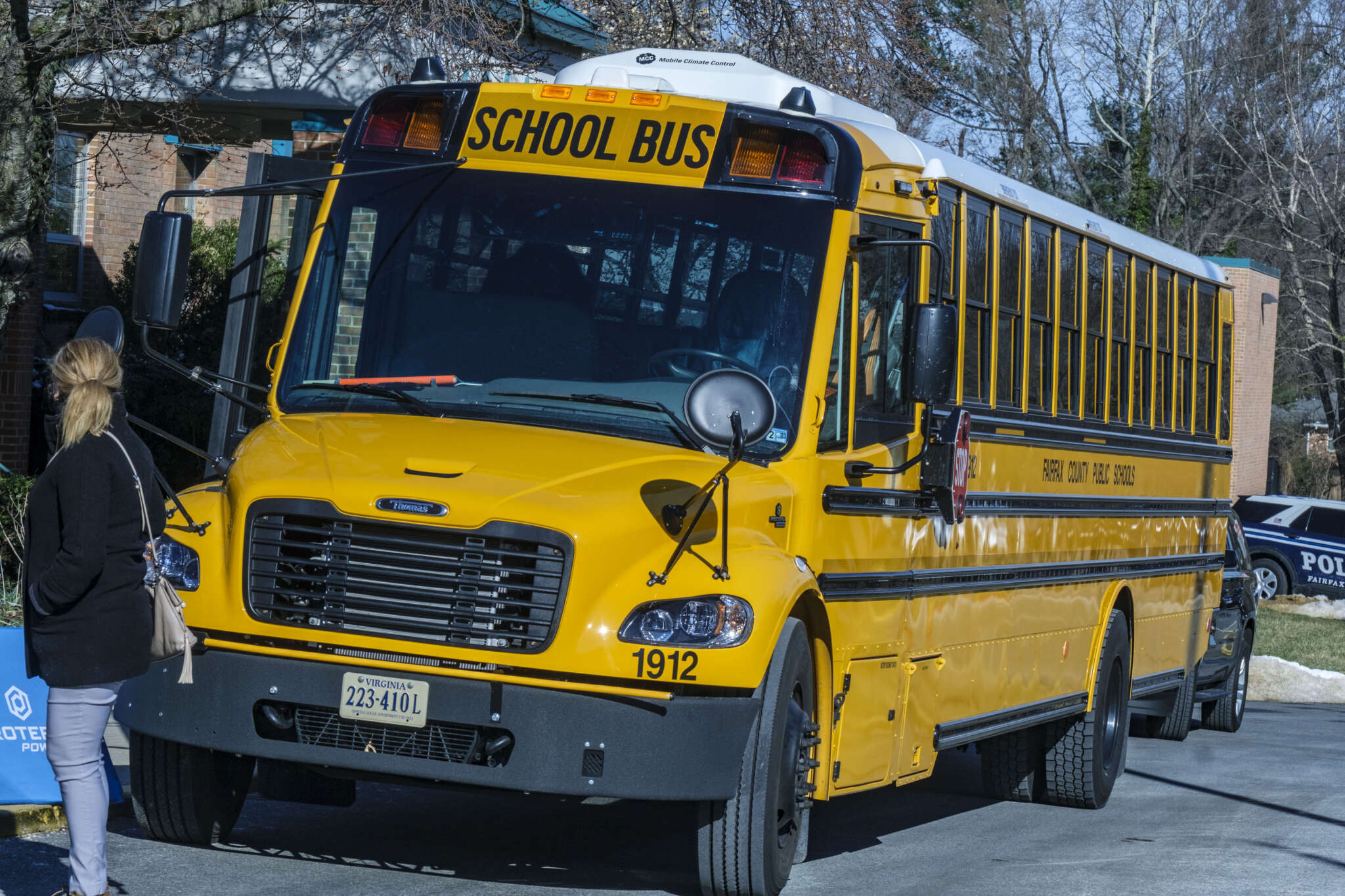
Fairfax County Public Schools will more than double the number of electric buses in its fleet, thanks to a new federal grant.
The local school system has been awarded $16.59 million as a winner of the U.S. Environmental Protection Agency’s inaugural Clean School Bus program grants competition. The other winner announced yesterday (Monday) was also from Virginia: Newport News Public Schools will receive $525,000.
The funds will enable FCPS to purchase 42 electric school buses. According to its website, the district currently has eight electric buses in a fleet with 1,625 buses, but it was slated to add another 10 in 2022. FCPS didn’t respond by press time when asked to confirm whether those buses are now operating.
“We are honored and excited to be among the recipients of the Environmental Protection Agency’s Clean School Bus Awards,” FCPS Superintendent Dr. Michelle Reid said in a statement. “This recognition not only underscores our commitment to sustainability and environmental stewardship but also reflects our ongoing efforts to provide healthier, cleaner transportation for all Fairfax County Public Schools students.”
FCPS has pledged to provide entirely carbon-neutral student transportation by 2035. The first electric school bus arrived in January 2021 as part of a statewide initiative led by Dominion Energy, which had proposed replacing all diesel school buses in Virginia by 2030.
However, the Virginia House of Delegates voted against expanding Dominion Energy’s program that spring, instead creating a grant fund that never got funding.
After getting eight electric buses from Dominion in 2021, FCPS received a state grant for 10 buses out of a settlement agreement with Volkswagen, which had been sued in 2016 for cheating on vehicle emissions tests.
The new federal grant funds come from the Bipartisan Infrastructure Law signed by President Joe Biden in 2021, allocating $5 billion to create the Clean School Bus program, which is dedicated to replacing existing school buses with “zero-emission and low-emission models.”
While FCPS intends to buy electric buses, Newport News requested funding to add propane-fueled buses, a switch it said will reduce emissions and lower fuel and maintenance costs.
Rep. Gerry Connolly called the grant “a game-changer” for FCPS.
“The environmental benefits of these new buses are vitally important to our fight against climate change, but the good news doesn’t stop there,” Connolly said. “Students, staff, and parents who spend time on and around school buses will no longer be exposed to diesel exhaust and other toxins from diesel-powered buses.”
This is a gamechanger for Fairfax County. Clean school buses will bolster our fight against climate change and protect the health of students, staff, and parents.⁰
This win comes thanks to the #BipartisanInfrastructureLaw signed by President Biden.⁰https://t.co/mcAKAvZZoH https://t.co/an33Aarx5K— Rep. Gerry Connolly (@GerryConnolly) January 8, 2024
Outside of the school system, the Fairfax County government adopted an operational energy strategy in 2021 whose targets included converting all of its buses and fleet vehicles to electricity or another non-carbon-emitting fuel by 2035.
Fairfax Connector, the county’s public bus system, welcomed its first electric buses in September, and the Department of Public Works and Environmental Services added an electric trash truck in August.
Late last year, the county launched a Climate Action Dashboard to keep track of its progress on various efforts to combat climate change. The transportation portion of the dashboard indicates that the county government has acquired 224 hybrid and 50 fully electric vehicles, putting it just 1.5% of the way to its goal of completely transitioning in just over a decade.
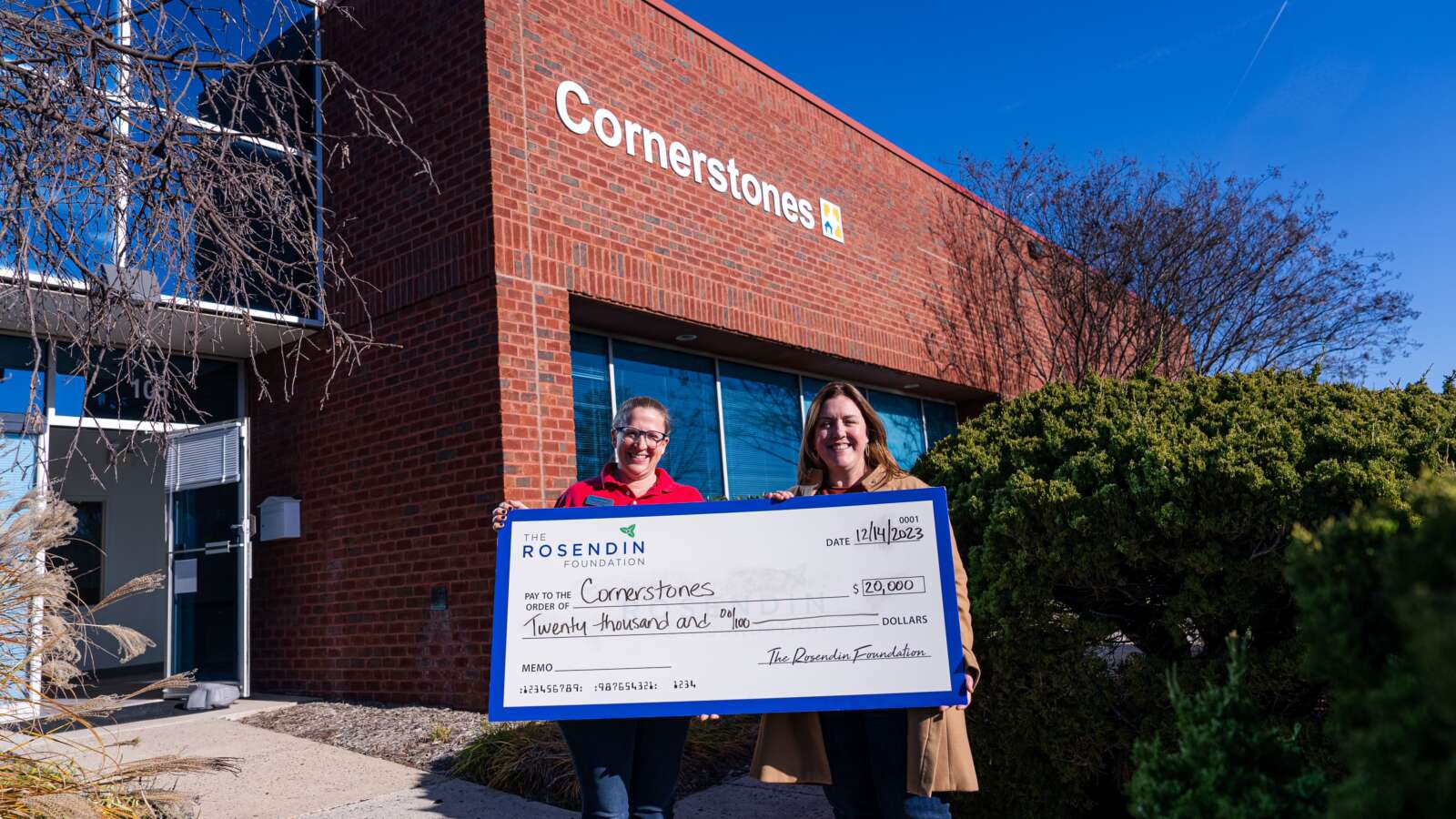
Cornerstones, the Reston-based nonprofit that runs the Embry Rucker Community Shelter, among other services, has received an early Christmas present in the form of a big check.
Earlier this month, The Rosendin Foundation — a charitable corporation that aims to support local communities through financial grants and volunteer work — awarded $20,000 to the organization.
Other organizations that received funds include:
- Women Giving Back ($25,000), a Sterling-based organization that serves women and children in crisis
- Mobile Hope ($10,000), a Leesburg group that provides support and emergency shelter to young people
- Our Minds Matter ($5,000), a youth suicide prevention organization centered in the D.C. area
- The Chris Atwood Foundation ($5,000), which is based in Fairfax and provides resources and advocacy for people affected by substance use
“The Rosendin Foundation continues to stand by its commitment to support community initiatives and organizations that resonate with our mission to positively impact communities, build and empower people, and inspire innovation,” The Rosendin Foundation President Jolsna Thomas said in a press release.
The organization is the charitable arm of Rosendin Holdings, which is based in San Jose, California, and one of the largest electrical contractors in the country.

Some facility upgrades are in the works for three Fairfax County parks.
The Fairfax County Park Authority (FCPA) Board approved a total of $55,325 in Mastenbrook grants on Wednesday (Dec. 13) to help fund improvements at Lake Fairfax Park in Reston, McLean Central Park and Frying Pan Farm Park south of Herndon.
Lake Fairfax Park (1400 Lake Fairfax Drive)
The Cricket Association of Fairfax County (CAFC) was awarded $15,325 to replace Lake Fairfax’s cricket pitch, which was developed in 1997 and is “one of the few in the Northern Virginia region large enough to meet the international standards of cricket,” according to the FCPA.
In its proposal to the park authority, the association reported that it has replaced the field’s artificial turf three times in the past 20 years, but inadequate drainage has damaged the wicket — a concrete base covered by artificial turf used to bounce the ball — and results in frequent waterlogging.
“Recent discussions with the park management have resulted in the determination that the wicket cannot be repaired,” the CAFC said. “A new wicket needs to be constructed with elevation and drainage to prevent water build up.”
The project to replace the pitch’s base and turf carries a total estimated cost of $30,650, half of which will be covered by the cricket association.
McLean Central Park (1468 Dolley Madison Blvd)
The 28-acre park near the McLean Community Center is getting a renovated basketball court, thanks to a friends group formed this year to honor Thomas A. Mulquin, a McLean resident who was “an avid supporter of basketball,” according to an FCPA staff summary for the board.
“The basketball court is currently in disrepair and therefore seldom used,” the Friends of Thomas A. Mulquin wrote in its grant application. “A tree root protrudes through the surface at one end of the court and a thicket downhill at the other end makes retrieving balls difficult and unsafe.”
Supported by $45,176 in community contributions, on top of $20,000 from the park authority, the $65,176 renovation will refurbish the court surface, update the color coating and line painting, replace both hoops and add a 10-foot-tall chain link fence “to prevent basketballs from going into the heavy overgrowth near the court,” according to the FCPA press release.
Frying Pan Farm Park (2709 West Ox Road)
Spirit Open Equestrian also requested and received a $20,000 grant — the maximum allowed for a single project by the Mastenbrook Grant Program, which provides matching funds for park improvements undertaken by local residents or community groups.
The nonprofit wants to bring electricity to the equestrian facilities where it provides therapeutic horseback-riding programs. The four horse barns and three sheds with supply and office space currently rely on solar panels, which are limited in capacity and unreliable, depending on the season, per the grant application.
“The project plan proposes to have Dominion Energy extend power from an existing cell tower, and then to contract with a vendor to outfit the buildings with wiring, conduit, outlets and related electrical components,” FCPA staff said.
With the project estimated to cost $72,458, the park authority grant will be supplemented by $52,458 from SOE.
All three projects are on track to be completed by spring 2024, according to the park authority.
These will be the last improvements supported by Mastenbrook grants for the time being. The FCPA has suspended applications to the 25-year-old program as it conducts a review, prompted by concerns about a gap in the quality of park facilities based on the ability of different neighborhoods to fundraise.
“The goal of the review is to examine the process through an equity lens and determine how to improve accessibility and benefit of the program in all areas of the county — particularly in communities of opportunity,” the park authority said.
FCPA staff are expected to deliver recommendations for the program’s future to the board in early 2024.

Fairfax County officials are gearing up to expand the police department’s use of automated license plate readers (ALPR).
The Fairfax County Board of Supervisors approved a $136,270 grant from the U.S. Department of Justice today (Tuesday) to further support the program. The Fairfax County Police Department is seeking the expansion in response to a rise in violent carjackings and stolen vehicles, according to county staff.
The FCPD introduced the camera system last year with an eight-week trial period that placed the technology in two locations. This spring, the department installed another 25 readers, extending the trial through Oct. 31.
Over the last 13 months, county officials say the police department has recovered 125 stolen vehicles and 22 firearms using the technology. The system also reportedly helped find 19 missing persons.
“The placement of these systems into neighborhoods will foster new partnerships with the communities that have requested LPR support. It will also increase communications between police and the neighborhoods,” county staff said in a memo to the board.
The camera system comes from Flock Safety, which has installed ALPRs in more than 2,000 localities across the country.
The technology captures a vehicle’s license plate, color, make and model and sends a real-time alert to law enforcement if a stolen vehicle used in a crime matches records in the database.
County officials say the program doesn’t conflict with the county’s public trust and confidentiality policy, which aims to ensure that immigrant residents can utilize county services without the fear that information will be disclosed to federal immigration officials.
“The FCPD LPR program specifically prohibits users from using the system to identify, alert, or enforce any immigration related warrants, which is a practice that is reinforced in the training class and every time a user logs into the system,” county staff wrote.
The FCPD is permitted to store data for up to one year, but Flock Safety’s system only stores data for up to 30 days, FFXnow previously reported. The issue of data retention has been a subject of legal and legislative debate.
In 2019, a federal court ruled that an FCPD database of photos of vehicle license plates violated Virginia privacy law. A year later, the Virginia State Supreme Court overturned that decision. During its session this year, the General Assembly considered a bill that would limit how data from ALPRs is stored, but it was left in a senate transportation committee.
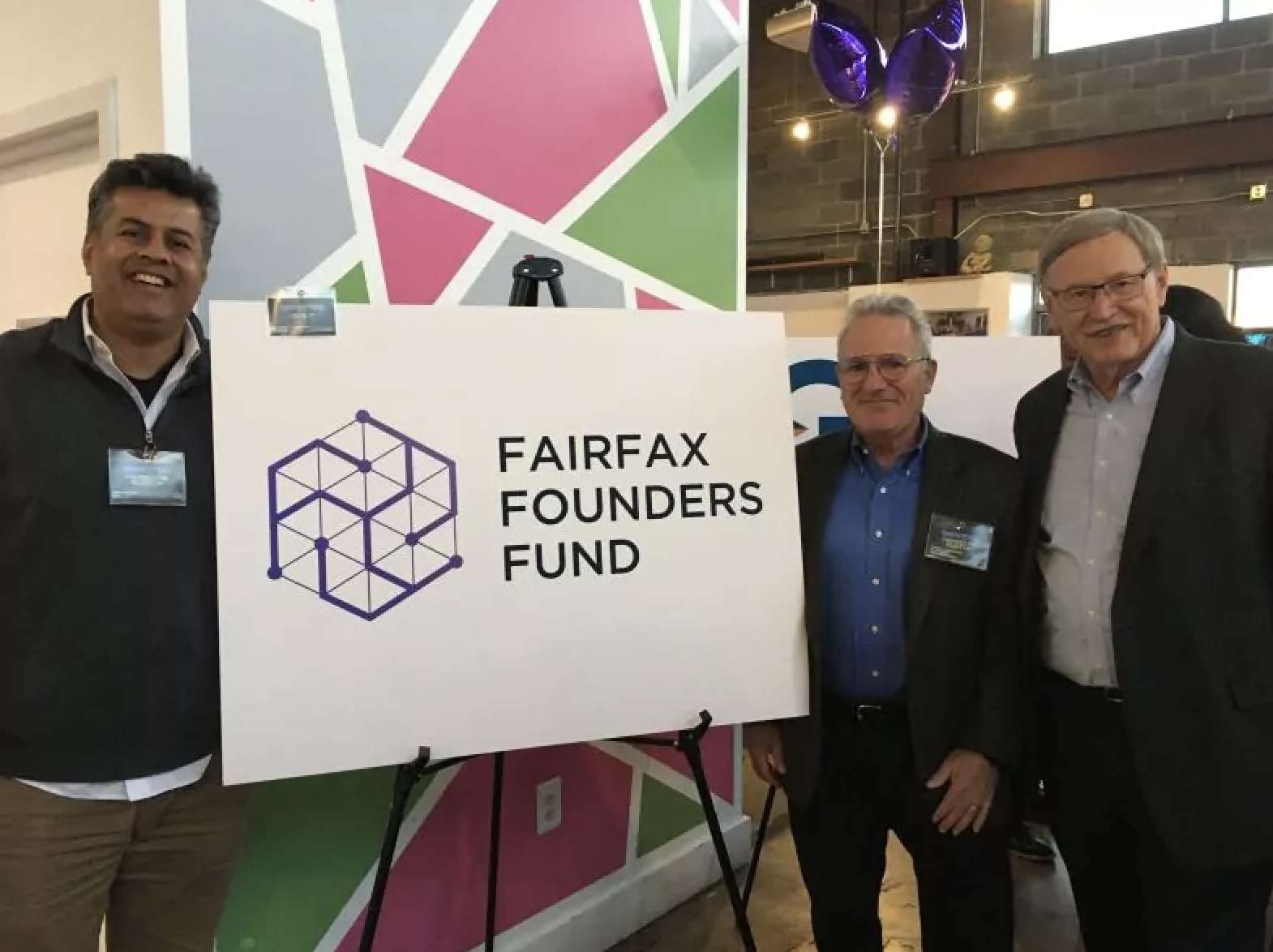
A medical device printer in Herndon is among five local companies that will receive funding from Fairfax County’s new grant program for startups.
3D Orthobiologic Solutions (3DOS), which launched in 2019, seeks to manufacture 3D-printed medical devices and dental impacts.
“Their IP technology licenses a Stanford University patent. The company has been accepted by Johnson & Johnson’s accelerator program JLABS,” the county said in an overview.
The Fairfax County Department of Economic Initiatives announced the inaugural winners of Fairfax Founders Fund grants earlier this month. The fund is intended to support companies that are involved in creating innovative technology products and have demonstrated potential for growth.
The other four companies that received funds are:
- Anapact: An Alexandria-based company that makes smart headgear for boxers and MMA fighters to offer real-time feedback on performance, impact and damage.
- BloomCatch: The Centreville company aims to combat the growing labor shortage in the gardening industry by offering digital access to plant care information through an app to train employees.
- NearStar Fusion: The Chantilly-based company, which was founded in 2023, provides a globally scalable clean fusion energy option by using pulse plasma guns as a new component for a fusion power plants.
- Healp: The company, which is based in Fairfax Station, provides an app that connections patients and medical providers that focuses on rare conditions and illnesses at no cost to the patient.
“We are delighted to recognize and support these exceptional startups in Fairfax County,” Department of Economic Initiatives Director Rebecca Moudry said in the announcement. “These grants will empower our local firms to advance their innovations, meet business goals, and drive economic growth and technological progress in our community.”
The application period for the next round of funding runs from Nov. 27 through Jan. 8. Companies receive up to $50,000 to prepare for later-stage investment.
To be eligible, companies must be based in Fairfax County, have raised no more than $1 million of startup funding so far and have received no more than $250,000 gross revenue in the 12 months before they apply, among other criteria.
First proposed in July 2021, the Fairfax Founders Fund was conceived as a way to support female, Black and Hispanic entrepreneurs, who are less likely to receive investments for startups from other sources than male and white entrepreneurs.
“The primary objectives of the fund are to stimulate economic development, connect startups with local resources and partnerships, and promote economic mobility by ensuring that early-stage capital is accessible to entrepreneurs from diverse backgrounds,” the Fairfax County Economic Development Authority said.
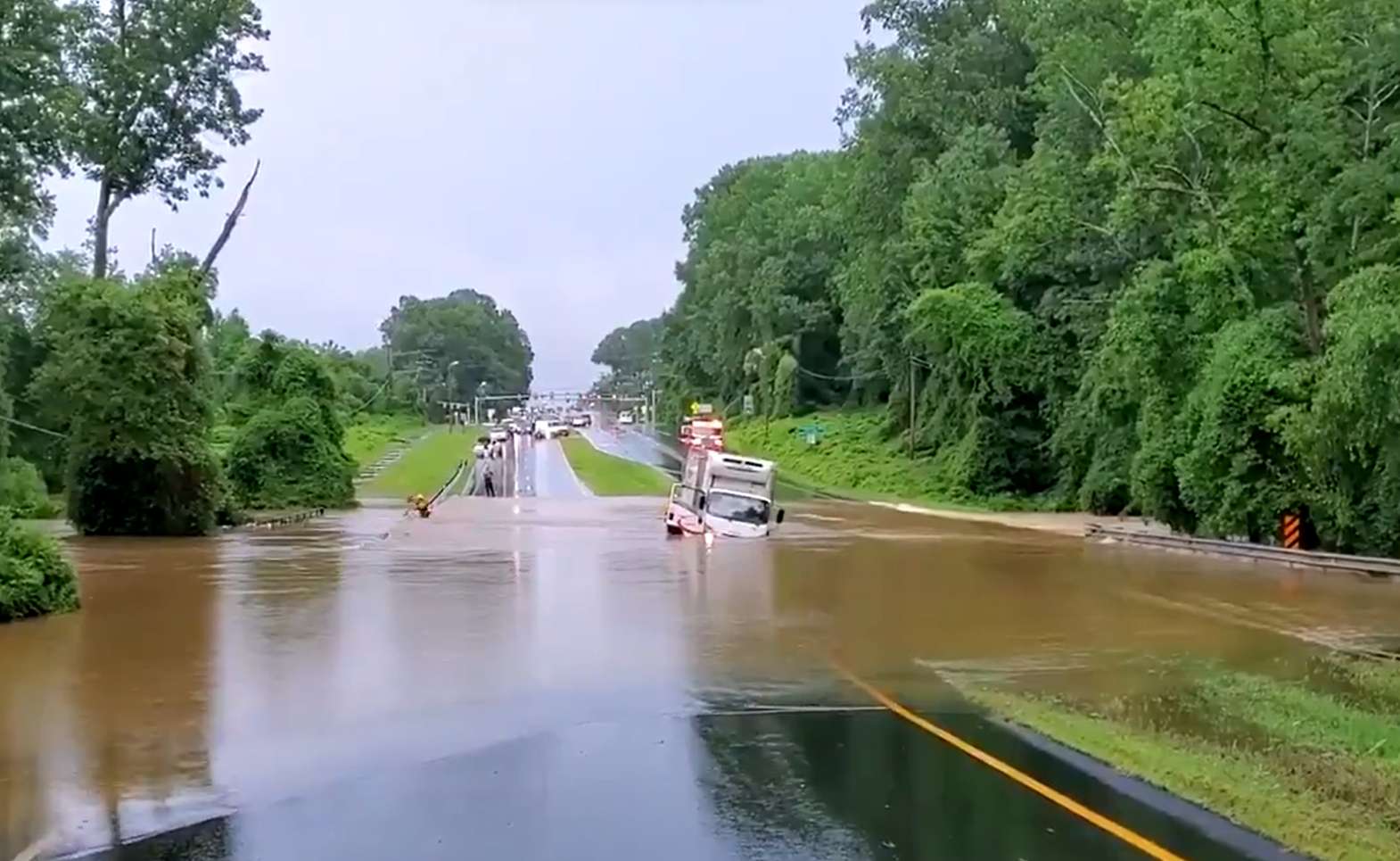
The Fairfax County Department of Public Works and Environmental Services (DPWES) has proposed a new grant program to help curb flooding in the county.
The flood mitigation assistance program (FMAP) would reimburse residents and property owners for purchasing and installing approved products and services that reduce the risk of flood damage to their property.
The program calls for a cost-sharing agreement where the resident or property owners cover 50% of the cost, and the county covers the other half up to $5,000, DPWES Deputy Director Eleanor Ku Codding told the Fairfax County Board of Supervisors at an environmental committee meeting on Tuesday (Oct. 3).
The program was made to be flexible, according to Codding. It’s open to residential or commercial multi-family properties, common-interest communities, and places of worship. Approved flood mitigation practices include:
- window wells
- flood gates
- modified basement areaways
- sump pump backup batteries
- utility protection
- exterior grading or drains
However, if an owner wanted to use another flood mitigation service not listed, it would be considered on a case-by-case basis.
Codding said, since drainage is not a straightforward issue, sharing the cost is a good solution.
“By establishing a cost-share program, we are allowing residents to be empowered to take action to mitigate that risk of flooding,” she said. “In addition, we have seen that the best flood risk reduction programs — including FEMA — include these types of cost-share programs.”
Dranesville District Supervisor John Foust supported the program but called for the county to take more action.
“We should be thinking bigger in terms of stormwater management because it’s a huge problem,” Foust said. “And once we adopt this, then we’ll be done with it. We’ll check it off and move on to the next thing, and I just think the problem deserves more.”
Codding said other programs could be brought to the board in the future.
The county has discussed raising its building stormwater standards to accommodate more frequent and extreme flooding, and earlier this year, it piloted a program for sharing the cost of projects with private property owners, essentially testing the approach proposed for the new assistance program.
Funded through the county’s Stormwater Service District taxes, FMAP would start on July 1, 2024, and applications would be reviewed on a first come, first served basis. The Northern Virginia Soil and Water Conservation District would administer the program.
DPWES will return to the board at a public hearing to get authorization to sign the memorandum of understanding with the conservation district. The agreement will establish rules for how the district should administer the program.
Screenshot via FCFRD/Twitter
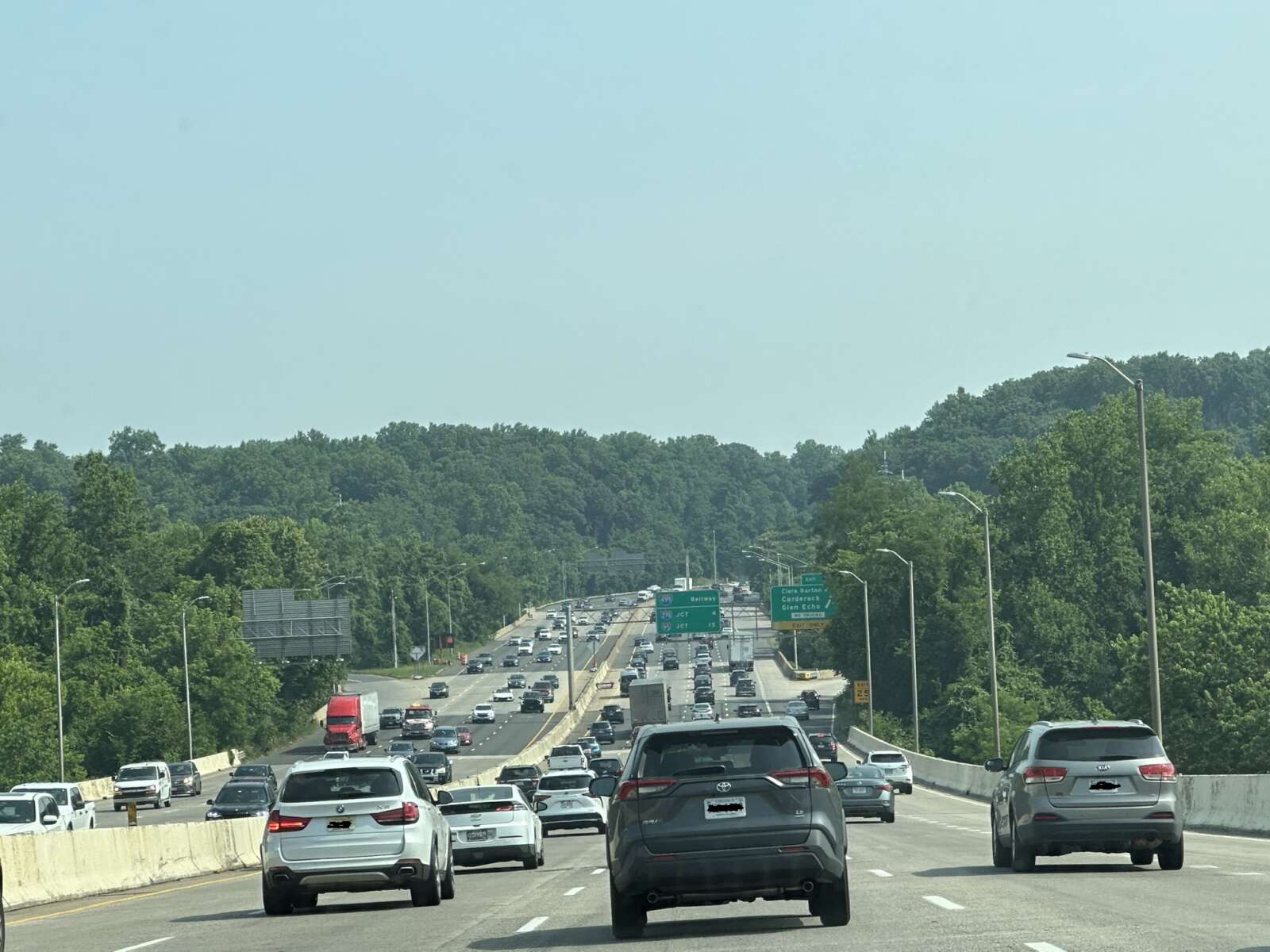
(Updated at 9:35 a.m. on 8/22/2023) Maryland has renewed its commitment to replacing the American Legion Bridge and adding express lanes on the Capital Beltway, much to the relief of Northern Virginia transportation officials.
The Maryland Department of Transportation has applied for a federal grant to fund the initial phase of its project to widen the Beltway (I-495/I-270) and reconstruct the aging bridge, which provides the only road connection between Fairfax County and Montgomery County, Maryland Gov. Wes Moore announced today (Monday).
The announcement is the first indication of how Maryland will proceed since private express lanes operator Transurban backed out in March over concerns about delayed environmental approvals, lawsuits and the change in leadership after Moore succeeded Larry Hogan in January.
Since Hogan and then-Virginia governor Ralph Northam announced an agreement in 2019 to replace the heavily used American Legion Bridge, Maryland’s cooperation has been seen as critical to the success of Virginia’s I-495 Northern Extension (495 NEXT) project, which is now under construction and will extend the Beltway’s toll lanes from the Dulles Toll Road in Tysons to the bridge north of McLean.
“Governor Moore’s plan ensures these long-awaited improvements will become a reality. This is great news for area travelers and the economic competitiveness of our entire region,” Northern Virginia Transportation Alliance President Jason Stanford said in a statement. “The Alliance applauds Governor Moore for finding a multimodal solution to address one of the region’s worst bottlenecks and move more people through one of our most congested corridors.”
The Virginia Department of Transportation has estimated that 495 NEXT will move 2,500 more people per hour in both directions when the express lanes open in 2025. However, it would move 5,400 more people an hour with Maryland’s project in place.
Skeptics of 495 NEXT, including Dranesville District Supervisor John Foust, have argued that widening I-495 in Virginia without a concurrent widening in Maryland will only push the existing congestion further north, leaving McLean residents to deal with the traffic, environmental and neighborhood impacts without getting any of the supposed benefits.
Noting that many details of Moore’s plan have yet to be shared, such as what kind of “managed lanes” will be involved, Foust called the announcement “great news” as a sign that Maryland is committed to helping address congestion on the American Legion Bridge.
However, assuming it secures the necessary approvals and funding, the Maryland project will still likely take years to complete, Foust said in a statement.
The estimate I have seen is that the project could be complete in eight years (by 2031) if all goes well. Unfortunately, that means commuters who cross the American Legion Bridge, and residents of the communities around the bridge, will continue to suffer from the impacts of severe congestion for at least that long unless something is done in the interim. Given the miserable traffic conditions around the bridge, eight years is too long to wait for any relief. That is why I believe VDOT needs to deliver interim solutions that mitigate the congestion impacts over the bridge and in the surrounding neighborhoods.
The 495 NEXT project was designed to seamlessly connect to a version of an American Legion Bridge project that we now know will not be built. In addition to very nasty congestion, established neighborhoods along the path of the 495 NEXT project are being severely impacted by construction activity. Given the dramatic change of plans and potentially major reduction of scope for the Maryland project, I believe VDOT should determine whether and by how much it can reduce the scope of disturbance of its project to help mitigate those construction-related impacts on the adjacent communities.
Shifting away from the public-private partnership that Hogan sought and that has built Virginia’s growing express lanes network, Moore emphasized in his announcement that Maryland’s project will incorporate transit and other multimodal improvements, including pedestrian and bicycle access. Read More

